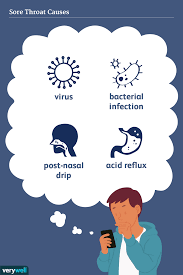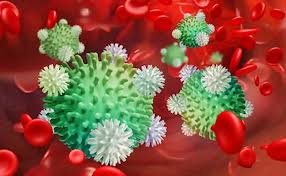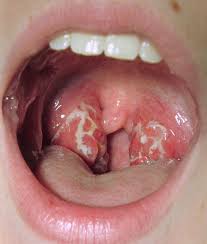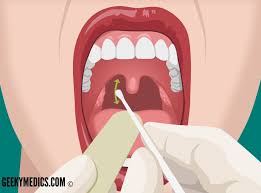Understanding and soothing a Sore Throat (Pharyngitis)
Conquer a Scratchy Throat! Learn about pharyngitis (sore throat) causes, symptoms, home remedies, and prevention strategies. Trusted health info.
A sore throat, medically termed pharyngitis, is an inflammation of the pharynx, the area in your throat between your tonsils and voice box. This common condition affects people of all ages and has various causes. This guide explores the reasons behind a sore throat (sore throat causes), its symptoms (sore throat symptoms), and ways to find relief (sore throat relief).

What Causes a Sore Throat?
Viruses are the most frequent culprits behind sore throats. These are the same viruses that cause the common cold or flu and spread through respiratory droplets when someone coughs or sneezes.

Bacteria can also cause sore throats, with streptococcal throat being the most well-known example. This condition, caused by Streptococcus pyogenes bacteria, requires prompt medical attention and antibiotics to prevent complications.

Beyond infections, other factors can irritate your throat and lead to pain, such as:
Allergies
Exposure to smoke, including secondhand smoke
Overuse of your voice from yelling or talking too much (vocal strain sore throat)
Dry air
Acid reflux (GERD sore throat)
Recognizing a Sore Throat’s Symptoms
Symptoms of a sore throat can vary depending on the cause, but some common ones include:
A scratchy or painful feeling in your throat (sore throat pain)
Difficulty swallowing (dysphagia)
Redness or swelling in your throat
Enlarged tonsils (swollen tonsils)
White patches or pus on your tonsils (more common with bacterial infections)
Fever
Coughing
Headaches
Body aches

It’s important to note that these symptoms can overlap with other illnesses like tonsillitis or the common cold. If your symptoms are severe or don’t improve after a few days, it is important to see a doctor early for a proper diagnosis and treatment plan because sore throat may be an early sign of serious life threatening immuno compromised disease like HIV, Glomerulonephritis or Rheumatic Fever.

Finding Relief from a Sore Throat
Treatment for a sore throat depends on its cause. Viral infections typically don’t require medication and focus on relieving discomfort while your body fights off the virus. Here are some home remedies to soothe a sore throat (home remedies for sore throat):

Get plenty of rest.
Drink warm liquids, like broth or tea with honey.
Gargle with warm salt water.
Use throat lozenges or sprays.
Avoid irritants like smoke and secondhand smoke.

If your doctor diagnoses a bacterial infection, they will prescribe antibiotics. It’s crucial to finish the entire course of antibiotics to ensure the infection is completely cleared (antibiotics for sore throat). Additionally, over-the-counter pain relievers like acetaminophen or ibuprofen can help manage pain and fever. Always follow recommended dosages and consult your doctor if symptoms worsen or persist (over the counter medication for sore throat).

Complications of untreated Strep sore throat
Streptococcal sore throat, also known as strep throat, can lead to several potential complications if left untreated. Here are some of the most common:
Rheumatic fever: This is a serious inflammatory disease that can affect the heart, joints, skin, and nervous system. It’s caused by an autoimmune reaction triggered by untreated strep throat. Symptoms can include fever, joint pain, swelling, and a characteristic red rash called erythema marginatum.
Post-streptococcal glomerulonephritis: This is an inflammation of the kidneys that can occur after a strep infection, including strep throat. Symptoms may include blood or protein in the urine, high blood pressure, and swelling.
Peritonsillar abscess: This is a collection of pus that forms in the tissue behind the tonsils. It can cause severe pain, difficulty swallowing, and a muffled voice.
Sinusitis: Strep bacteria can sometimes spread to the sinuses, causing a painful sinus infection. Symptoms include facial pain, pressure, congestion, and a runny or stuffy nose.
Scarlet fever: While not a direct complication, scarlet fever is another infection caused by the same group of bacteria (Streptococcus pyogenes) that causes strep throat. It’s characterized by a red, sandpapery rash along with a sore throat and fever.

Early diagnosis and treatment of strep throat are crucial to prevent these complications. If you suspect you or someone you know has strep throat, see a doctor promptly. They can perform a simple strep test to confirm the diagnosis and prescribe antibiotics to eliminate the bacteria and reduce the risk of complications.

Preventing a Sore Throat
While completely preventing a sore throat isn’t always possible, some practices can minimize your risk (prevent sore throat):
Wash your hands frequently and thoroughly.

Avoid close contact with people who are sick.
Cover your mouth and nose when you cough or sneeze.
Don’t share personal items like utensils or cups with sick individuals.
If you smoke, quit. If not, avoid secondhand smoke exposure.
Stay hydrated and maintain a healthy lifestyle.

By following these preventive measures, you can reduce your chances of getting a viral or bacterial infection that can cause a sore throat (sore throat prevention tips).
When to See a Doctor for a Sore Throat

Most sore throats improve with home care within a few days. However, seek medical attention if you experience:
Severe symptoms that don’t improve after a few days
Difficulty breathing or swallowing (difficulty swallowing sore throat)
High fever that doesn’t respond to medication (high fever sore throat)
Frequent episodes of sore throats
Confirmed exposure to strep throat (strep throat exposure)
Early medical intervention ensures a proper diagnosis and appropriate treatment plan, especially for bacterial infections.
Conclusion
A sore throat, or pharyngitis, can be caused by viruses, bacteria, or other factors. Symptoms can vary but often include throat pain, swallowing difficulty, and tonsil inflammation. Treatment options range from home remedies for viral infections to antibiotics for bacterial infections like strep throat. Practicing good hygiene and preventive measures can significantly reduce your risk of getting a sore throat and contracting Life threatening complications.

Lorem ipsum dolor sit amet, consectetur adipiscing elit. Ut elit tellus, luctus nec ullamcorper mattis, pulvinar dapibus leo.















Comments
Post a Comment
If you have any query, doubt or seek any advice or help, I am always available.